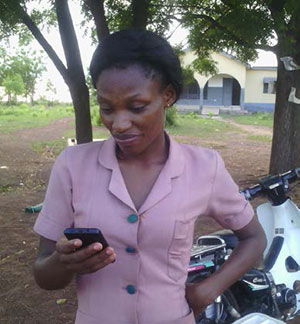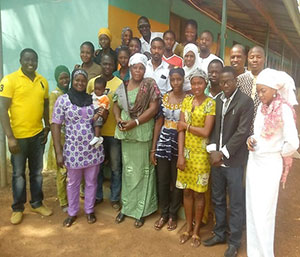Ghanaian Health Workers Collaborate Using WhatsApp Messaging

Historically, nurses and other health workers trained in community-based infant and young child feeding (C-IYCF) serving communities in northern Ghana had no way to reach beyond colleagues and supervisors in their immediate geographic area for advice and support. Now, with the help of a free messaging application available through smartphones (WhatsApp), they can turn to colleagues for assistance at any time.
At a C-IYCF training for health workers conducted by SPRING, a participant asked how trainees could access information and support each other as they worked in distant communities. Cupid Adumbireh, a SPRING/Ghana district coordinator, suggested the team create a WhatsApp message group. The group now has 54 members, with at least one point-person who owns a smartphone at each of the 11 participating health facilities in Tolon District. Group members include midwives, community health nurses, enrolled nurses, and state registered nurses.
Using a WhatsApp messaging group, Ghanaian health workers can access professional support and guidance, even in remote regions of the country.
Because frontline health workers play an invaluable role in improving infant and young child feeding practices, helping C-IYCF trainees communicate well is important. Health workers use the messaging group to discuss C-IYCF-related questions and receive responses from both colleagues and SPRING/Ghana district officers. This sharing of information and experiences helps SPRING/Ghana move toward its ultimate goal: contributing to a reduction in stunting and anemia through the promotion of better nutrition and hygiene practices.
Giving health workers an easy way to collaborate, while preserving client privacy, has resulted in better service. For example, sharing a photograph of an ailing mother on the platform led to discussions that helped diagnose and treat her mastitis, a condition that affects lactating women’s breastfeeding abilities.

In another instance, a nurse correctly diagnosed a child with severe malnutrition. Based on responses to a nurse’s query on WhatsApp, both the mother and child were referred to Nyankpala Health Center, where they were admitted into a program for community-based management of acute malnutrition.
In addition to providing professional support and guidance, the platform allows SPRING/Ghana district officers to send updates and reminders to staff. Although not all C-IYCF trainees have access to WhatsApp, the number of trainees who do have access to smartphones makes the group sustainable. Since its inception in March 2015, more health staff have been added to the platform during post-training monitoring visits and review meetings. The district nutrition officer and four other facilitators were made administrators of the group to keep it running after SPRING closes.
Building on the success of the messaging group in Tolon, SPRING/Ghana has replicated the initiative in eight more districts and plans to establish additional groups in the remaining districts by the end of 2017. Staff will also use the platform to disseminate short IYCF counseling videos that will help mothers visualize exclusive breastfeeding and complementary feeding practices.